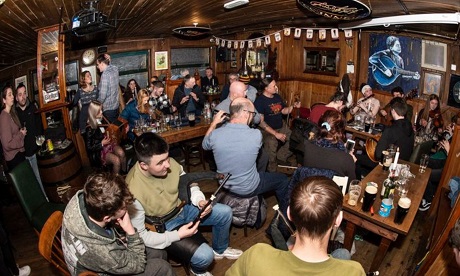Belfast is in many ways still a deeply divided city, but last week young people from Catholic and Protestant communities – who live apart and go to religiously segregated schools – played music together at Belfast Summer School of Traditional Music, as part of the week long Belfast TradFest.
From the sound of bagpipes echoing in St Anne’s Cathedral in Belfast, to the first ever concert of Irish and Scottish music in Protestant east Belfast and primary school-age banjo players holding their own in an afternoon pub performance, the city is buzzing with the sound of traditional music everywhere you turn.’
More than 500 people of all ages are taking the summer school classes to learn traditional music, song and dance, and there are thousands more attending talks, sessions and concerts.
Fiddle player and summer school tutor Martin Dowling, who has written about traditional music and the peace process, tells me that music did not escape the schism that the Troubles caused in the city in the 1970s.
“The Troubles pushed traditional music in Belfast into more hidden, segregated spaces and, although there had always been Protestants who played traditional music, a generation of urban Protestants rejected it as something that was exclusively Catholic.”
Meanwhile, in the rest of Ireland there was an explosion in the popularity of traditional music with groups such as the Chieftains, Planxty and the Bothy Band, and the emergence of festivals and the annual summer schools which have become a key part of encouraging and nurturing traditional instrument playing, singing and dance culture.
Traditional players in the north talk about having to always travel long distances to go to summer schools and Ray Morgan, chair of the event’s board, tells me he would take young people to schools over the border every year.
After the Good Friday agreement there was a significant increase in Catholics learning to play the music but organisations in the city that had been trying to create non-sectarian spaces for traditional music were up against the cultural schism left over from the Troubles.
It was Morgan who had the idea for a similar school in Belfast, and who, with Dónal O’Connor – a fiddle player, film-maker, and now the event’s artistic director – made it a reality in 2015.
“Traditional music was undervalued and hidden here compared to the south and I thought this would help change that,” Morgan says.
O’Connor describes how widening access to every community in the city is at the core of what the organisers set out to achieve.
“From day one we wanted, given the fractured society we have here after the Troubles, to find a way to make everybody feel that this music was theirs. We are trying to normalise all these things that were perceived to be for the other.” Read more
- Dave McNally writes for The Guardian newspaper
